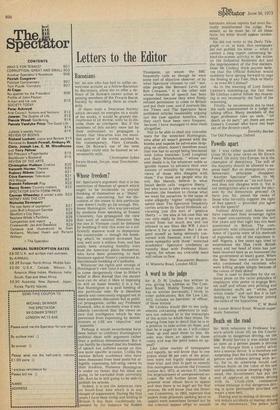A word to the judge
Sir: A. D. M. Lindsay has written to you, giving his address as The Com mon Room, Middle Temple, and he has so written previously. I think, to other publications. But the Law List, 1972, includes no barrister, or officer, of those initials.
Mr Lindsay would like to see judgements containing references to matters not referred to in the transcripts of the action to which they relate, On hearing from him in detail that he is in a position to take action on them, and that he is eager to do so. I will collect them up and send them to him. He asks was there an appeal in these cases, and was the point taken on appeal? Like other readers of newspapers and reports, he will know that in one prison alone 80 per cent of the prisoners were not legally represented at their trial, and that in part to remedy this outrageous situation the Criminal Justice Act, 1972, at section 37, forbids the imprisonment of unrepresented accused. He will further know that a prisoner must obtain leave to appeal and that there is no legal aid for that process. He will know that the Donovan Committee, in 1965, reported that papers from prisoners seeking leave to appeal were sometimes farmed out by the criminal appeal office to outside barristers whose reports had even factually misinformed the judge. Possessed, as he must be, of all these facts, his letter would appear tendentious.
He did not write to the Daily Telegraph — or, at least, that newspaper did not publish his letter — when it carried a long report concerning behind-the-scenes activity in the action on the Industrial Relations Act and the imprisonment of the five dockers. Does Mr Lindsay think anyone believes that the Official Solicitor would suddenly have sprung forward to urge the freeing of any Tom, Dick or Harry — or even Mr Lindsay?
As to the meaning of Lord Justice Lawton's summing-up, the fact that Mr Lindsay cannot follow my reasoning is not necessarily the fault of the reasoning.
Finally, he recommends me to read the oath administered to a judge on taking office. Many members of the legal profession take an oath, " till death us do part;" yet there are even Queen's Counsel who have not kept out of the divorce court.
Dorothy Becker The Old Parsonage, Oxford


































 Previous page
Previous page